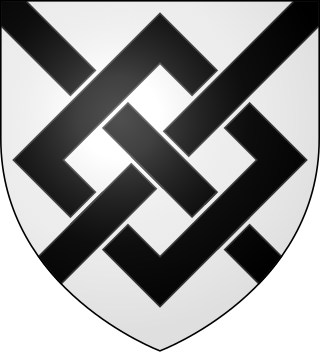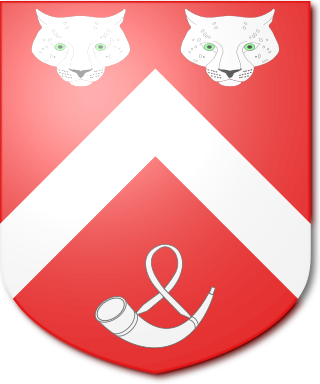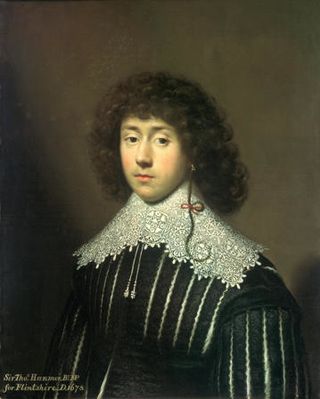Sir William Lowther, 1st Baronet was an English landowner from Marske-by-the-Sea, Yorkshire. He was the eldest son of Anthony Lowther and Margaret Penn, daughter of Sir William Penn.
The Fenwick Baronetcy, of Fenwick in the County of Northumberland, was a title in the Baronetage of England. It was created on 9 June 1628 for Sir John Fenwick, of Wallington Hall, Northumberland. He sat as Member of Parliament for Northumberland and Cockermouth. The second and third Baronets also represented Northumberland in Parliament. The title became extinct when the third Baronet was executed for treason on 27 January 1697.

There have been twenty one baronetcies created for persons with the surname Williams, eight in the Baronetage of England, three in the Baronetage of Great Britain and ten in the Baronetage of the United Kingdom. Only six of the creations are extant as of 2017.

There have been three baronetcies created for members of the Vernon family.
There have been four baronetcies created for persons with the surname Rich, two in the Baronetage of England, one in the Baronetage of Great Britain and one in the Baronetage of the United Kingdom. As of 2008 three of the creations are extinct while one is dormant.
There have been three baronetcies created in the Baronetage of England for members of the Skipwith family of Skipwith, Yorkshire, which relocated to Lincolnshire in the 14th century. They were a successful court family, with one member, Margaret Skipwith, seen as a possible queen of England after the death of Henry VIII's third wife, Jane Seymour. One creation of the baronetcy is extant as of 2008.

There have been four baronetcies created for members of the ancient House of Beaumont, all in the Baronetage of England. All four creations are extinct or dormant.

There have been two baronetcies created for persons with the surname Yelverton, both in the Baronetage of England.

The Warburton Baronetcy, of Arley in the County of Chester, was a title in the Baronetage of England. It was created on 27 June 1660 by Charles II for George Warburton, of Arley Hall, Cheshire, whose great-uncle had been Sergeant at Law and a Justice of Common Pleas in the time of Charles I. The Warburton family removed from Warburton, Cheshire to Arley in the 14th century. The third Baronet was a Knight of the Shire for Cheshire. The title became extinct on the death of the fifth Baronet in 1813. The Cheshire estates passed into the Egerton-Warburton family and then to Viscount Ashbrook.

There have been three baronetcies, all in the Baronetage of England, created for members of the Spencer family, both for descendants of two younger sons of Sir John Spencer (1524–1586) of Althorp, Northamptonshire.
Sir Thomas Trevor, 1st Baronet was a Welsh politician who sat in the House of Commons of England variously between 1640 and 1648.

There have been four baronetcies created for members of the Slingsby family who settled at Scriven Hall, Scriven, Knaresborough, Yorkshire in the 14th century.

Sir Thomas Hanmer, 2nd Baronet was an English politician who sat in the House of Commons in 1640 and from 1669 to 1678. He was a Royalist during the English Civil War and raised troops for Charles I. In his personal life, he was a keen horticulturist. He is not to be confused with Sir Thomas Hanmer, 2nd Baronet (1747–1828) of the second creation, nor with his grandson, Sir Thomas Hanmer, 4th Baronet.

There have been two baronetcies- both extinct- granted to the Willises of Fen Ditton, both in the Baronetage of England.
The Topp Baronetcy, of Tormarton in the County of Gloucester, was a title in the Baronetage of England. It was created on 25 July 1668 for Francis Topp. The title became extinct on the death of the third Baronet in 1733.
The Sands Baronetcy, of Blackhall, Kildare, was a title in the Baronetage of Ireland. It was created on 21 December 1676 for William Sands, High Sheriff of Kildare at the time. The title became extinct on the death of the second Baronet in circa 1704.

The Wolstenholme Baronetcy, of London, was a title in the Baronetage of England. It was created on 10 January 1665 for John Wolstenholme, who had previously represented West Looe, Newport and Queenborough in Parliament. He had been heavily fined by the Parliamentarians for supporting the Royal cause during the Civil War. The third Baronet sat as Member of Parliament for Middlesex. The title became extinct on the death of the seventh Baronet in 1762.
The Cobb Baronetcy, of Adderbury in Oxfordshire, was a title in the Baronetage of England. It was created on 9 December 1662 for Thomas Cobb. The title became extinct on the death of the third Baronet on 29 March 1762.
Sir Edmund Denton, 1st Baronet, of Hillesden, Buckinghamshire, was an English Whig politician who sat in the English and British House of Commons from 1698 to 1713.
Sir Thomas Newcomen, 5th Baronet of Kenagh, co. Longford was an Anglo-Irish baronet and Jacobite soldier.










